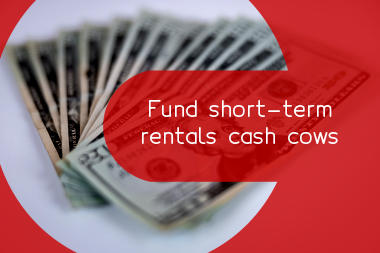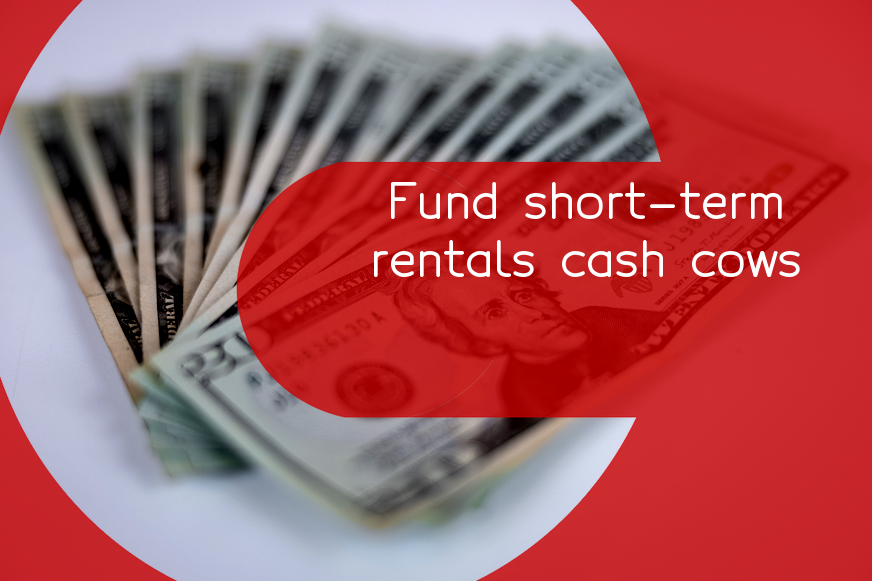Here are some general ways to find money to finance short-term rentals:
- 1. Personal savings: If you have been saving money over the years, you can consider using these funds to invest in short-term rentals.
- 2. Credit cards or lines of credit: You can use credit cards or lines of credit to finance your short-term rental investment. However, this method comes with higher interest rates, and it's crucial to make sure you can repay the debts on time to avoid mounting interests.
- 3. Crowdfunding: Crowdfunding is a modern way of funding projects through online platforms like Kickstarter. You can pitch your rental property idea to potential investors who are willing to finance the project.
- 4. Home equity loans or home equity lines of credit: If you own a property with significant equity, you can explore these two financing options. In a home equity loan, you borrow a lump sum of money that you repay with interest over time. In a home equity line of credit, you can access funds when you need them and pay interest on the balance.
- 5. Business loans: Some lenders specialize in providing financing to real estate investors. You can explore various options and compare interest rates, repayment terms, and other factors before deciding on a lender.
Before considering any financing option, it's essential to do extensive research, create a financial plan, and consider the risks and potential rewards of your investment.
Will short-term rentals continue to be cash cows?
Short-term rentals can continue to be cash cows if they are properly managed, marketed, and located in popular destinations. If the demand remains high, hosts can charge higher rates and generate high profits. However, factors such as regulation, competition, economic fluctuations, and unforeseen events can impact profitability. Hosts who provide exceptional guest experiences and maintain high standards of cleanliness and safety are more likely to succeed in the long term.
Everything you need to know about financing short-term rental properties
Financing short-term rental properties involves obtaining financing specifically for a property that will be used as a vacation rental or temporary accommodation for guests. Here are the key things to know about financing short-term rental properties:
- 1Down Payment: Just like with any other real estate investment, youll need to provide a down payment in order to obtain financing for a short-term rental property. Generally, the down payment will be between 20-30% of the propertys value, but this can vary by lender and your creditworthiness.
- 2Interest Rates: Interest rates for short-term rental property financing tend to be higher than traditional residential mortgages due to the higher risk of this type of investment.
- 3Types of Loans: There are a variety of loan types available for short-term rental property financing, including conventional loans, government-backed loans, and commercial loans. Its important to research the requirements and benefits of each option to determine which is the best fit for your investment needs.
- 4Occupancy and Income: Lenders may require information on projected occupancy rates and rental income when evaluating your loan application. Its important to have a solid understanding of the rental market in the area and the potential income that can be generated from the property.
- 5Insurance: Most lenders will require you to obtain specific insurance coverage for your short-term rental property, including liability insurance and property damage insurance. Be sure to factor these costs into your financial planning.
- 6Regulations: Depending on the state or local laws where the property is located, there may be specific regulations in place for short-term rentals, such as limits on the number of guests, occupancy taxes, or licensing requirements. Its important to research and comply with all applicable regulations to avoid legal issues.
Overall, financing short-term rental properties requires careful planning and research to ensure that the investment is financially viable and meets all legal requirements.
Other questions about STR financing
" However, here are some common questions related to short-term rental (STR) financing that people ask:
- 1What is STR financing?
- 2How can I finance my STR property?
- 3What are the advantages of STR financing?
- 4What are the requirements to qualify for STR financing?
- 5What types of loans are available for STR financing?
- 6What are the interest rates for STR financing?
- 7What are the repayment terms for STR financing?
- 8How long does it take to get approved for STR financing?
- 9What are the risks involved in STR financing?
- 10What is the difference between STR financing and traditional real estate financing?
- 11Can I use my STR property as collateral for financing?
- 12What is vacation rental financing, and how does it differ from STR financing?
- 13Are there any restrictions on using financing for STR properties?
- 14How much down payment is required for STR financing?
- 15Can I get financing for an existing STR property or only for a new investment?
Conclusion
In general, the conclusion of short-term financing rentals depends on the specific terms and conditions of the rental agreement, the financial status and capability of the renter, and the current market conditions. Short-term financing rentals can offer flexibility, convenience, and affordability to renters, but they may also result in higher overall costs and risks of default or foreclosure. It is important for renters to carefully evaluate their financial situation and thoroughly review the terms of the rental agreement before deciding to pursue short-term financing rentals.
Just one more thing: if you liked the article, please like us on social media and share this article with friends.



